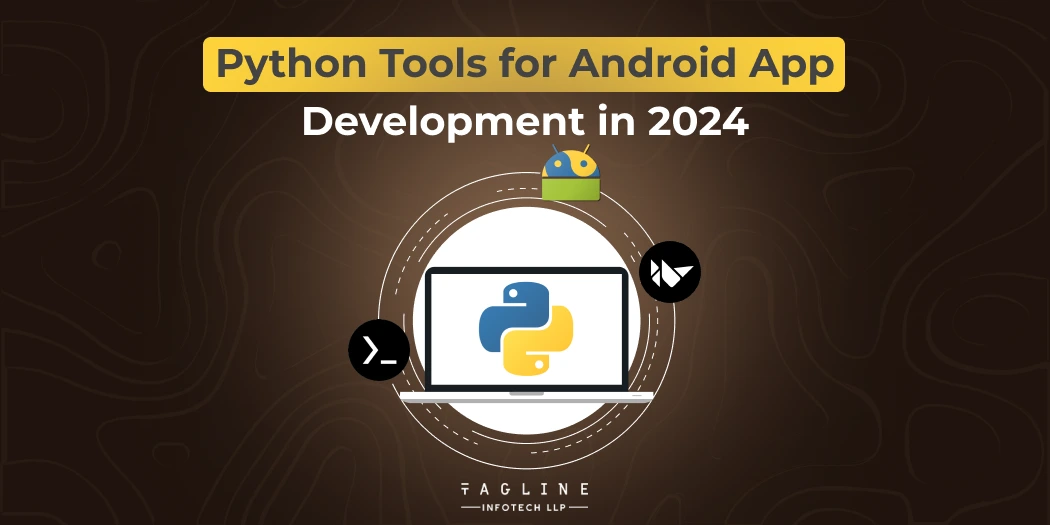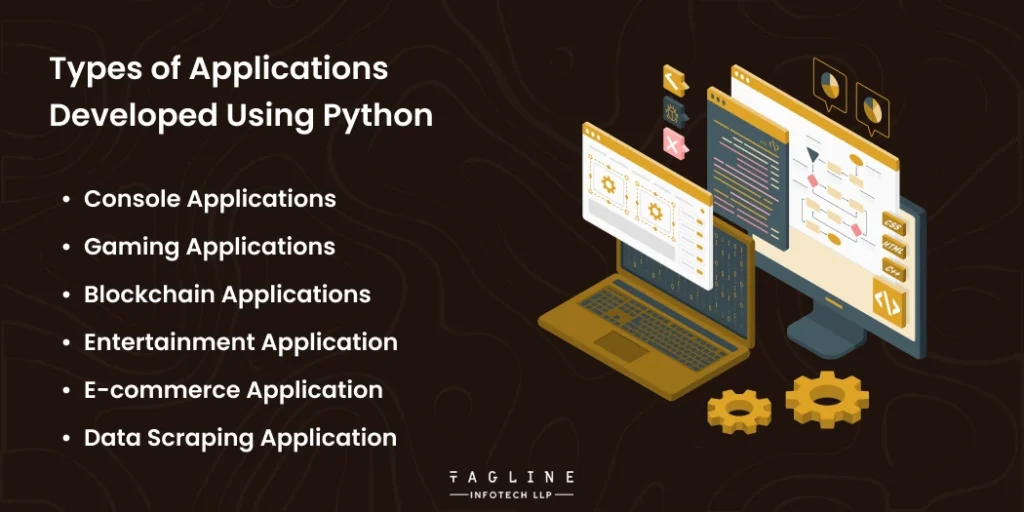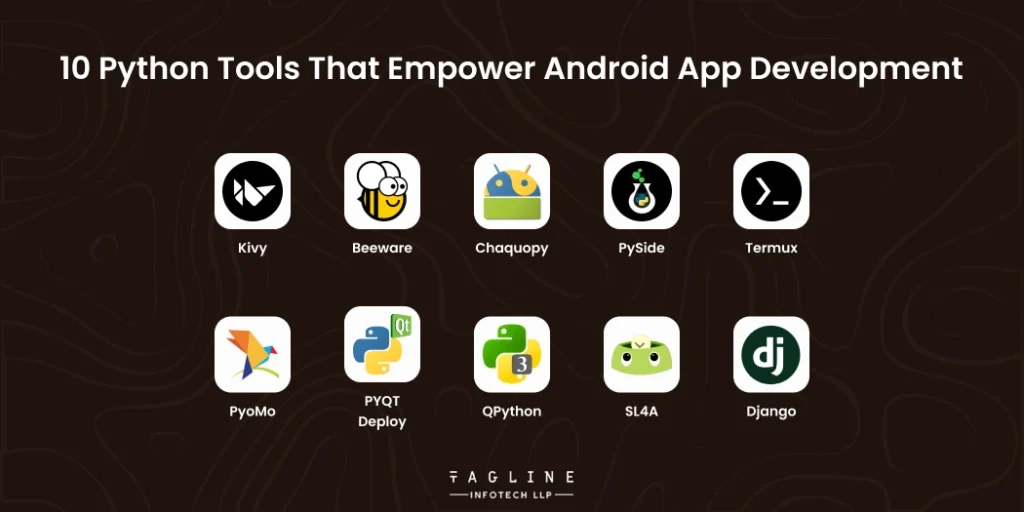Finance & IT Email Marketing: A Data-Driven Approach
February 2, 2026
Home >> Python >> Python Tools for Android App Development in 2024

Quick Summary
Trends in technology are changing quickly right now. Companies are searching for opportunities and languages, like Python, to help them adjust to these shifts and create a unique identity for each brand. Numerous new programming languages have entered the market, providing businesses with distinct benefits. Conversely, Python Tools for Android App Development have gained popularity due to Python’s extensive range of features, functions, and application programming interfaces (APIs).
Python offer numerous advantages to applications in terms of flexibility and scalability. It has become a prevalent programming language for creating Android apps. Developers use Python on various projects, from web applications to Android applications. For this reason, businesses are ready to recruit Python programmers from within.

Console programs are commands that use straightforward language to accomplish tasks efficiently with the least amount of user interface possible. An alternate way of describing it is as a program intended to be read in plain text. This application is an excellent choice for companies searching for a quick user experience that doesn’t require much user involvement.
Because Python is an easy-to-learn language with a high degree of functionality, developers love writing code and creating robust programs. The main benefit of Python is that it can be scaled, which is why developers are using it more and more to create game apps. This greatly facilitates the creation of complex gaming scenes. Python’s real-time testing features enable production processes to accelerate.
Blockchain technology has emerged as a conveniently buildable and controllable trend recently. It’s been a while since this trend started. However, Python simplified matters much further. Creating an application is surprisingly simple because Python is a reasonably straightforward language. Using a Python framework like Flask, developers can create an endpoint and establish a connection to a blockchain via the internet to access its various capabilities. Decentralized networking can be developed using many software packages kept on different machines.
In recent years, a wide variety of audio-video formats have become available online, and users have expressed a strong need for programs comparable to these that can be downloaded. Python is a popular programming language, but it can also be a good choice for creating this audio-visual application.
There is no doubt as to why we are using e-commerce. This industry is expanding at a very rapid rate. Additionally, companies that utilize them can boost their profits. Almost everyone has access to the internet at all times. People detest waiting at the checkout counter when they shop for food. The concept of e-commerce has benefited people worldwide since it is a simple and practical choice. Python is a highly flexible programming language that makes it possible to complete agile software development procedures quickly. There are better programming languages for creating a web application.
The Python programming language is a solid option for creating various scraping applications. With Python for Automation, online data can be easily scraped due to the availability of powerful tools like Beautiful Soup and excellent libraries like Requests. The Python syntax is a great starting point for developing data-scraping programs. Because it allows users to compare prices, jobs, and conduct research, this app is far more valuable than others.

One of the most popular Python tools for Android app development is Kivy. This utility was released in 2011 to empower Python developers to design state-of-the-art mobile applications for various operating systems, such as Linux, Android, and macOS. One feature of the open-source KIVY application is the Natural User Interface (NUI). A comprehensive library and several user interface functions are provided to create cross-platform applications.
Essential Features of Kivy:
Pros:
Cons:
User interface is seen as complicated by some users
Beeware is a popular Python software for creating Android applications. It is employed in developing software for many operating systems, including Windows, Linux, iOS, Android, and macOS. Beeware is a well-known name in open-source software development, and the entire developer community can modify the Beeware suite.
Features of Beeware:
Pros:
Free to use as it is BSD Licensed
Community support is good
Cons:
Learning curve is complicated
It is a Python software development kit (SDK) for Android applications. With this tool, developers can create Android applications using a range of programming languages, including Python and Kotlin. A direct integration with Android Studio is conceivable. The Java Application Programming Interface (API) and the Python API are the two options for developers to create Android apps. Furthermore, Chaquopy is a reasonably easy platform for Android developers to start using, making it an ideal choice for a Python development company looking to enhance their app development process. Third-party developers can install it as a plugin in Android Studio.
Features of Chaquopy:
Pros:
Cons:
Small community
PySide is a multi-platform graphical user interface toolkit that is available for free. In addition, it provides a core user interface system built on widgets that may be utilised to deutilizedpealing Android applications. All Python bindings required for an Python app development are comprised within the PySide 2 module. To use various graphical user interface (GUI) and visual elements, the application’s creators use three primary modules: Qt Core, Qt GUI, and Qt Widgets.
Features of PySide:
Pros:
Licensed by LGPL
Also represents the official Python bindings associated with the Qt company
Cons:
Documentation is poor
Both app developers and community members who test Android applications use the well-known Android terminal Termux. With this application, developers can work with a fully complete Linux environment in addition to the terminal of the Android operating system. By using Termux, the developers can access a vast array of Linux capabilities. These characteristics include several Linux shells, support for multiple programming languages, including Python and Perl, external keyboard and mouse support, and secure server SSH access.
Features of Termux:
Pros:
Many terminal shell options can be accessed
Multiple plugins are supported
Cons:
Learning curve is not straight
PyMob is used by developers to create mobile applications. This framework allows programmers to create applications that function on several operating systems, including Windows, iOS, and Android. It is easy to comprehend and implement because of the extensive documentation. The database connected to the mobility parameter and the library providing access to it are included in the framework. It is known for being an incredibly user-friendly platform that lets developers utilise many of their apps’ features.
Features of PyMob:
Pros:
App features created once can be used till whenever you want.
Web apps can be written in Python
Cons:
Code works slowly
As its name implies, the PYQT deploy tool deploys applications created with Python versions. The PYQT app works with desktop and mobile apps and offers distributable packages with platform-specific customization.
Features of the PYQT Deploy:
Pros:
Cons:
Python documentation is not complete and poor
Developers can run PHP scripts on Android phones since QPython allows this functionality. It supports various application frameworks for libraries, consoles, interpreters, and editors. It also includes many SL4A libraries. QPython offers many valuable features, such as a runtime mode for Android devices, compatibility for standard library libraries, a user interface toolkit, Q Mode, and Web app mode.
Main features of QPython:
Pros:
Cons:
Many features are not supported by Android
A well-known Python package, The Scripting Layer for Android, or SL4A, is available. This library allows you to write scripts for the Android operating system. It is compatible with numerous scripting languages, such as PHP, Perl, JRuby, and others.
Features of the SL4A:
Pros:
Cons:
Relatively mall community as compared to others
Django is simply too good to ignore when choosing the finest Python framework for creating Android applications. Full-stack Python frameworks are gaining popularity among Python programmers who create web or mobile apps. Website development is made more accessible as developers have access to many valuable tools for data validation, caching, logging, and other uses.
Features of Django:
Pros:
Cons:
Time-to-market is an important consideration when creating an application. Since Python lacks a compiler, it uses an interpreter to execute the application immediately. This suggests that creating Android applications with this package will be a more dependable and efficient procedure.
When Python is utilised for tutilizedevelopment development, testing may be done at every development process level. Consequently, an organisation corganization receives a flawless mobile application that is quality functionality and error-free.
Python is a programming language that provides developers with an extensive library of pre-built scripts. Businesses can expedite the app development process by employing these. These libraries can also help integrate feature-rich functionality and develop user-friendly interfaces.
Being a dynamically typed programming language, Python is regarded as one of the best languages for creating apps. This problem makes better programming flexibility possible. The program only knows the variable type once the developers run the code.
There is undoubtedly a substantial community supporting Python. Everyone in the community has identified a range of new codes and added them to the libraries to help others achieve a more effective and efficient development procedure. Furthermore, a ton of training and resources related to the app production process are available in this community.
It should come as no surprise that Python applications are becoming more and more popular given the language’s strength and conciseness. It has been at the core of the most astounding technologies, including automation, machine learning, and artificial intelligence. Furthermore, it is employed to support subjects that are popular right now, such as data analysis and data visualization. If you’re looking to build such solutions, it’s crucial to hire Python developers who can leverage these capabilities effectively. The above list of Python tools will give you a glimpse of Android apps being developed from the same technology.
Python can be suitable for professional Android development, especially for prototypes and smaller apps. However, for larger projects, consider using Java or Kotlin for better performance.
Kivy allows for rapid prototyping, cross-platform compatibility, and an extensive set of widgets for creating user interfaces, making it an excellent choice for Android development.
BeeWare focuses on creating native applications with a look and feel consistent with the platform, while Kivy uses its own set of widgets for cross-platform development.

Digital Valley, 423, Apple Square, beside Lajamni Chowk, Mota Varachha, Surat, Gujarat 394101
D-401, titanium city center, 100 feet anand nagar road, Ahmedabad-380015
+91 9913 808 2851133 Sampley Ln Leander, Texas, 78641
52 Godalming Avenue, wallington, London - SM6 8NW